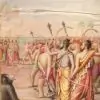Originally posted by: Chandraketu
Mandodari
Fully agree with ya!!!👍🏼
You are right for more than one reason:
1. Sita was abducted and held against her will;
2. Re: her chastity, what was the legal standard even then? Was it innocent until proven guilty, or guilty until proven innocent? Because the latter is how it turned out in Sita's case.
We cant anylise Ramayan of Treta Yug on the basis of modern jurisprudential concepts. We cant analyse Ramayan on the standard of moderns State-citizen or court-litigants relationship. There was so developed rule of procedure or codified law or evidence as today. Many ancient Indian jurisprudential norm do not match with todays norms. Both of u has used some legal term. chandra i guess u've studed law or political science. It was not typical court case regarding chastity of woman or or
quo warranto regarding Sits's entitlement to be queen or to continue as queen nor it was a parliamentary proceeding of impeachment , enquiry etc. So we just cant anyalyse Ramayan on the basis of todays norms n concepts.
For impartiality judge shud be totally disinterested in the cause according to natural justice which is now integral part of many legal system of today's world U must have heard "nemo judex in causa sua"---- no one shud be judge in his own cause one of the basic principle of natural justice. In those days function of executive, judiciary n legislature all were done by the king. In India it was be lived that supreme law or "Dharma' is king of kings an all kings r bound by it. If they fail to rule according to it they will be punished by God. Dharma was suprema lex , divine.
In uttar kand Ram was to judge n he n his wife Sita were a party here also. So it was impossible for him to be 100% impartial because he was judge in his own cause. He choose make his praja happy n choose sorrow for himself n Sita. Sita's second exile was equally painful for Ram in fact more painful. Sita was carrying no guilt feeling. This was her strength. But Ram knew that he took a harsh decision for Sita. With this feeling in heart he had to discharge all his royal duties n ensure welfare of his people. Thus this second separation was more painful for him
Status of Sita was totally different. Neither she was ordinary subject of Ayodhya nor was she one among the many wives of Ram. She was queen of Ayodhya. She was the wife of King of Ayodhya. Most imp this is that she is a avtar like Lord Ram. For her circumstances was different.
Today Sita is worshipped for her purity n benevolence n forbearance. Uttarkand made it possible
Manu prescribes certain rules for the king called Vrata. Indra accords rains for four months to sprout the seeds, so the king shall sprout the people's hopes. Sun evaporates earthly water slowly and insignificantly so as to give the next rain, so the king shall collect taxes and spend them again for the welfare of people suurya vrata . Air pervades everywhere to enliven people, so the king shall pervade everywhere through his agents to watch out good and evil for his subjects maaruta vrata . Yama, the God of Time, has no friends or foes and ends the lives of any one at the end of their time, and so shall the king in according punishments yama vrata . Rain binds one and all and it is the livelihood of any living being, so is king to bind his subjects for a good livelihood varuNa vrata . Moon is both a pleasant one and presiding deity for medicinal herbs, so shall the king be pleasant to his people and keep their health chandra vrata . Fire is fiery and burns down evil and the king shall be fiery to his enemies, either internal or external aagneya vrata . The earthly earth sustains scholars and stupid, wealthy and poor, prosperous and pathetic alike, so shall the king bear with all of his subjects pR^ithvii vrata.
Here they observed (Ram-Sita ) prithvii vrata. They sustained the stupid gossips of Avadhis. He knew that to remove this evil he'll have to give big sacrifices instead of punishment. Punishment wud've proved worthless here.
Originally posted by: Chandraketu
3. Another legal standard - okay, I'll admit guilty to thinking like 21st century rather than treta yuga, but wasn't there a conflict of interest involved? How could Rama be expected to make a decision on Sita - shouldn't that have been escalated to, say, Vaishistha, and let him give a ruling? After all, if Rama decided to keep Sita, it would be said that he was being partial to his wife, and if he decided, as he did, to get rid of her, it would be said that he was compelled to do it to demonstrate how he put his royal duties above his personal desires.
There's a reason that in juries, people who are related to parties in cases are waived from jury dury - conflict of interest. If I was being tried for a hit and run in Redwood Shores, there's no way my wife would be allowed to serve on that jury. And vice versa.
There was simply no way Rama could be impartial in this case for the simple reason of being Sita's husband (he'd either have favored Sita, thereby looking like he was being partial to his wife, or disfavored her, in which case he'd have looked like he was deliberately discriminating against her for the sake of his reputation), and shouldn't have been in the position to judge in the first place. So give it to an imparital third party adjudicator.
U cant apply nemo judex in causa sua principle here.
the object of Avatar of Ram Sita wud have failed had Ram not sent her to Ashram. Generation after genration doubt abt Sita wud have take a very very dirty shape. Sita was not a common woman. She was public figure. They r remmberd generaration after genrations. Public figure , great personalites r subject matter of dicussion , gossips even today. For her Shiv dhanush was broken she was the cause of Rams great war with Ravan. I was must for her honour. All her sacrifices obsevabce of Dhrama wud've been forgotten by later genrations(exept her stay in lanka). Try to see this issue from Sita's side
Originally posted by: Chandraketu
4. Why didn't the Avadhis object when she was being crowned, as Lalitha asked?
Remember Ram had to employ spies to find to what people thinks abt his administration .in was not a case of Referendum. The people protest was not a open one. They were enjoying dirty gossips abt their Queen which were intolerable for Ram. Might be Avadhis have doubts for Sita from moment they heard abt her abduction n her capture. But u cant expect people openly protesting or sending referendum against Sita before the most powerful Ram. Might be thay were thinking that if he can eliminate mightiest demon Ravan for, can give severe punishment for such remarks.His first duty when he reached Ayodhya was takeover kingdom secure its borders etc. As perVamiki Ramwas well versed in science of good administration. After he rule for sometime he wanted to know people opinion so he employed spies n the then he came to know abt people view abt Sita
Regarding whether the avadhis shud have gone with Ram or not my view that Lord Ram had done right by forgiving them . In those days ther were no newspapers tv radio or IT nor copies of
valmiki Ramayn were available for all in the bookstalls of Ayodhya. People didnt knew how things actually happened nor they knew abt Ravan that he was not that cheap person. He has his own ideals which he followed. Tehy had no idea of lanka palace ashok vatika etc etc. they knew the half news. Its a old saying "Ignorace is cause of the evil' n same happende with avadhis. If we were at Ram's place we wud not have forgiven them reason we r mere mortal beings not
God. But He is God. He created everything our action its fruits all belongs to Him so He can forgive avadhis
Edited by coolpurvi - 16 years ago




























